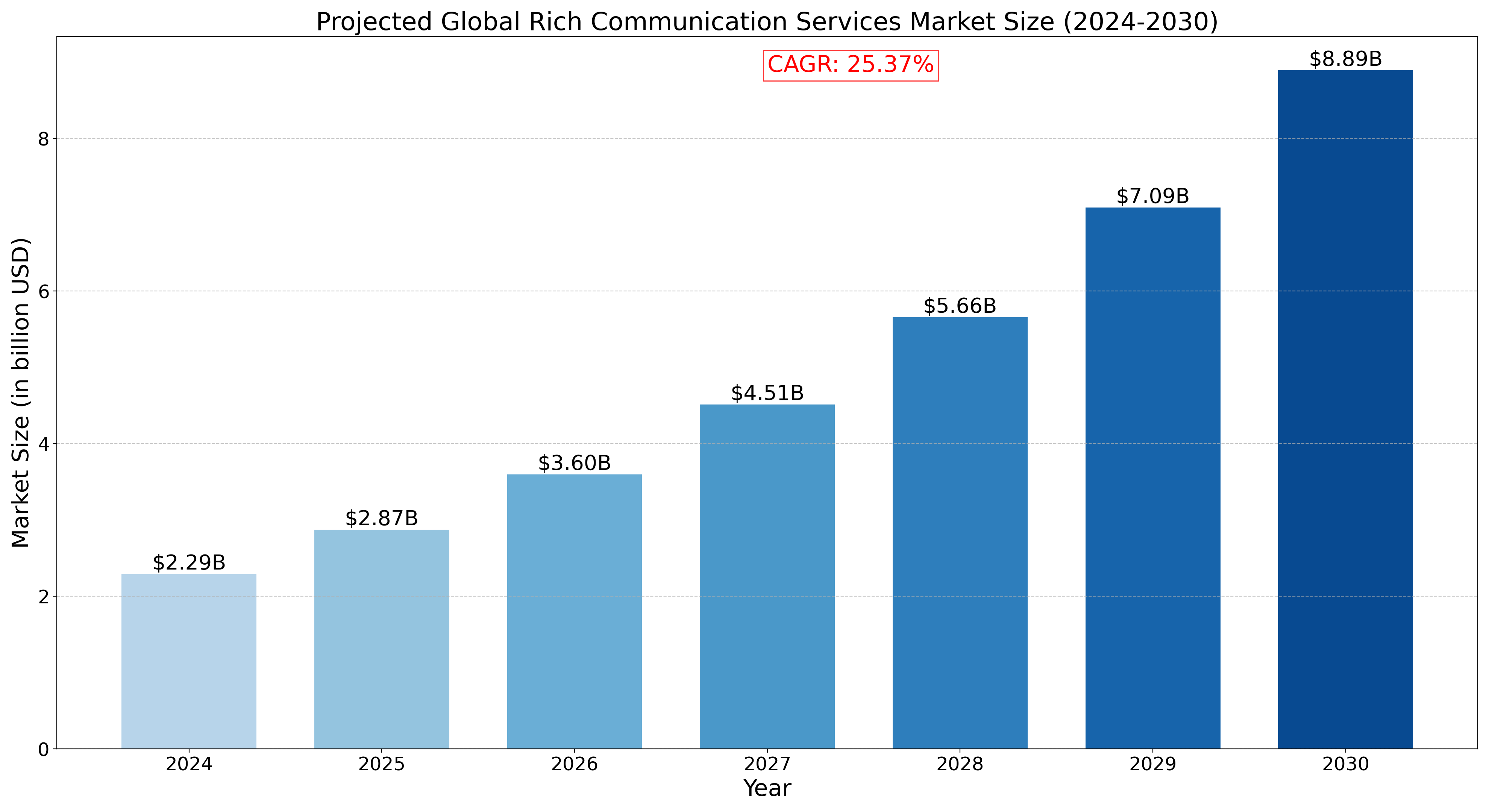The global Rich Communication Services market was valued at US$ 2.29 billion in 2024 and is projected to reach US$ 8.89 billion by 2030, at a CAGR of 25.37% during the forecast period. The influence of COVID-19 and the Russia-Ukraine War were considered while estimating market sizes.

The global key manufacturers of Rich Communication Services include China Mobile Communications Group, China Telecom, China Unicom, KDDI, NTT docomo, SoftBank, KT, SKT and LG U+, etc. in 2024, the global top five players have a share approximately % in terms of revenue.
Rich communication services refers to SMS-based SIM card breakthrough length limit and completion of text, graphics, audio, video, location translation and other information. In April 2021, China's three major transportation companies, China Telecom, China Mobile, and China Unicom Union released a white paper on 5G messages. 5G messages has been commercialized.
Rich Communication Services (RCS) is an enhanced communication protocol designed to replace SMS (Short Message Service) and MMS (Multimedia Messaging Service) on mobile networks. It aims to offer a more feature-rich messaging experience similar to that of modern messaging apps like WhatsApp, iMessage, and Facebook Messenger.
Features
- Enhanced Messaging: RCS supports sending high-resolution photos, larger video files, audio messages, and documents, unlike the limited capabilities of SMS and MMS.
- Typing Indicators & Read Receipts: Users can see when the other person is typing and whether their message has been delivered and read, similar to apps like iMessage or WhatsApp.
- Group Chats: RCS allows for group messaging with all the media and engagement features of individual chats.
- Location Sharing: It supports real-time location sharing, improving communication for both personal and business contexts.
- In-line Replies and Emojis: More interactive messaging options, such as the ability to respond to specific messages within a chat and use a wide range of emojis.
- Rich Cards: Businesses can use RCS for customer interactions, sending cards with images, quick reply buttons, and interactive elements that enhance customer engagement.
Business Applications
RCS is gaining traction as a platform for business-to-consumer (B2C) communication. It allows businesses to:
- Send branded messages, receipts, boarding passes, or reminders directly in the messaging app.
- Offer customer service through chatbots, allowing real-time interactions with customers.
- Facilitate purchases within a messaging interface, creating a seamless shopping experience without needing a separate app.
Adoption and Support
- Carrier Support: RCS is a carrier-based protocol, meaning it requires mobile carriers to support the technology. Major carriers globally, including Verizon, AT&T, and T-Mobile, support it, and many more are gradually adopting it.
- Android Native Support: Google has been a key advocate for RCS, integrating it into Android Messages. In fact, Google has pushed RCS as the default messaging protocol for Android users where available.
- Limited iOS Support: As of now, iPhones (which use iMessage) do not natively support RCS, which limits cross-platform use, though Apple’s stance may evolve.
Security
- Encryption Concerns: One of the criticisms of RCS is that it originally lacked end-to-end encryption (E2EE), which made it less secure than apps like iMessage and WhatsApp. Google has since rolled out end-to-end encryption for one-on-one RCS chats through its Messages app, but group chats may still not be fully encrypted in all implementations.
Global Interoperability
- To function across different carriers and regions, RCS relies on the Universal Profile, a standard that ensures RCS features are available consistently across networks, phones, and messaging apps. However, not all carriers have adopted the Universal Profile, which can lead to fragmentation.
Advantages Over SMS/MMS
- Higher Quality Media: Unlike SMS and MMS, RCS can handle sending large files, high-quality photos, and videos.
- Better User Experience: Features like typing indicators, read receipts, and group chat enhance the overall messaging experience.
- Business Communication: RCS creates new opportunities for businesses to engage with customers in a more dynamic and branded way.
Challenges
- Adoption Rate: Despite its potential, RCS adoption has been slow, primarily due to the need for carrier support and the fragmentation of the telecom industry.
- Competition with OTT Apps: Apps like WhatsApp, iMessage, and Facebook Messenger are widely used, and many users may not feel the need to switch to RCS if they are already comfortable with other messaging platforms.
- Apple’s Reluctance: One of the major hindrances is Apple’s refusal to adopt RCS, meaning that communication between Android and iPhone users doesn’t benefit from the enhanced features, keeping those interactions limited to SMS/MMS standards.
This report aims to provide a comprehensive presentation of the global market for Rich Communication Services, with both quantitative and qualitative analysis, to help readers develop business/growth strategies, assess the market competitive situation, analyze their position in the current marketplace, and make informed business decisions regarding Rich Communication Services. This report contains market size and forecasts of Rich Communication Services in global, including the following market information:
- Global Rich Communication Services Market Revenue, 2019-2024, 2025-2030, ($ millions)
- Global top five companies in 2024 (%)
The future of RCS largely depends on broader carrier adoption, especially the standardization across networks, and whether Apple chooses to adopt the technology. With the continued backing of Google and potential for widespread business applications, RCS could become a widely used communication tool in the next few years.
We has surveyed the Rich Communication Services companies, and industry experts on this industry, involving the revenue, demand, product type, recent developments and plans, industry trends, drivers, challenges, obstacles, and potential risks.
Total Market by Segment:
Global Rich Communication Services Market, by Type, 2019-2024, 2025-2030 ($ millions)
Global Rich Communication Services Market Segment Percentages, by Type, 2024 (%)
- APP+ Standard Product
- APP+ Original Message Entry
- Cloud Platform + Original Application
Global Rich Communication Services Market, by Application, 2019-2024, 2025-2030 ($ millions)
Global Rich Communication Services Market Segment Percentages, by Application, 2024 (%)
- Information Technology Service Business
- Public Management business
- Retail and Wholesale Business
- Culture and Tourism Business
- Financial Business
- Others
Global Rich Communication Services Market, By Region and Country, 2019-2024, 2025-2030 ($ Millions)
Global Rich Communication Services Market Segment Percentages, By Region and Country, 2024 (%)
- North America (USA, Canada, Mexico)
- Europe (Germany, UK, France, Russia, Italy, Rest of Europe)
- Asia-Pacific (China, Japan, South Korea, India, Southeast Asia, Rest of Asia-Pacific)
- South America (Brazil, Argentina, Columbia, Rest of South America)
- The Middle East and Africa (Saudi Arabia, UAE, Egypt, Nigeria, South Africa, Rest of MEA)
Competitor Analysis
The report also provides analysis of leading market participants including:
- Key companies Rich Communication Services revenues in global market, 2019-2024 (estimated), ($ millions)
- Key companies Rich Communication Services revenues share in global market, 2024 (%)
key players include:
- China Mobile Communications Group
- China Telecom
- China Unicom
- KDDI
- NTT docomo
- SoftBank
- KT
- SKT
- LG U+
- Google
- Including or Excluding key companies relevant to your analysis.
Outline of Major Chapters:
Chapter 1: Introduces the definition of Rich Communication Services, market overview.
Chapter 2: Global Rich Communication Services market size in revenue.
Chapter 3: Detailed analysis of Rich Communication Services company competitive landscape, revenue and market share, latest development plan, merger, and acquisition information, etc.
Chapter 4: Provides the analysis of various market segments by type, covering the market size and development potential of each market segment, to help readers find the blue ocean market in different market segments.
Chapter 5: Provides the analysis of various market segments by application, covering the market size and development potential of each market segment, to help readers find the blue ocean market in different downstream markets.
Chapter 6: Sales of Rich Communication Services in regional level and country level. It provides a quantitative analysis of the market size and development potential of each region and its main countries and introduces the market development, future development prospects, market space of each country in the world.
Chapter 7: Provides profiles of key players, introducing the basic situation of the main companies in the market in detail, including product sales, revenue, price, gross margin, product introduction, recent development, etc.
Chapter 8: The main points and conclusions of the report.

